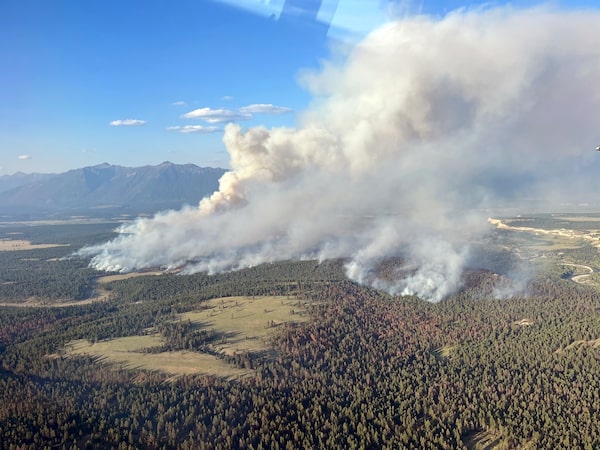
The St. Mary's wildfire in British Columbia. The situation is most severe in B.C. where 376 active wildfires were burning as of July 20.HO/The Canadian Press
Canada’s worst wildfire season on record has now killed three people working on the front lines in the last week as 600 wildfires continue to burn out of control.
On Wednesday evening, a helicopter pilot died when he crashed during firefighting operations in a remote location near Haig Lake, Alta., more than 300 kilometres northwest of Grande Prairie.
The pilot, identified as a 41-year-old male from Whitecourt, Alta., was flying a Bell 205A helicopter operated by Valhalla Helicopters when he was reported missing to the RCMP at 6:58 p.m.
The death was the third during firefighting operations in the last week. On July 13, 19-year-old firefighter Devyn Gale died after a tree fell on her near Revelstoke, B.C. Then on Saturday, 25-year-old firefighter Adam Yeadon died from injuries he sustained while working to contain a blaze near his home in Fort Liard in the Northwest Territories.
Environment and Climate Change Minister Steven Guilbeault addressed the situation at a news conference on the status of Canada’s dangerous wildfire season Thursday morning.
“They were serving their country and their communities and our thoughts are with their families, their friends and everyone who is mourning their loss,” said Mr. Guilbeault, before word of the third death had been reported.
There are 885 wildfires actively burning across the country with 600 determined to be out of control and 11 million hectares burned so far this year, Mr. Guilbeault said, making 2023′s wildfire season 10 times worse on average than what the country has experienced in the past.
“We are fortunate that there’s been few loss of lives, although tragic certainly, and few economic impacts or impacts to infrastructure and houses but obviously we are working very hard to limit those as much as we can,” Mr. Guilbeault said.
“It goes to show how we need as a country to be better prepared to face the impacts of climate change.”
André Picard: Where there’s smoke, there’s health risks for vulnerable groups
According to RCMP public information officer Corporal Troy Savinkoff, officers from Peace River responded to Wednesday’s crash site at about 8 p.m. and witnessed forestry workers performing CPR on the pilot. They assisted with transporting the man to Peace River Airport, where he was ultimately declared dead by emergency medical services.
Transportation Safety Board of Canada deployed a team of investigators to the crash site Thursday morning. Valhalla Helicopters, based in Kelowna, B.C., said it is not commenting on the situation at this time.
On a visit to Belleville, Ont., on Thursday, Prime Minister Justin Trudeau commented on the deaths of the three front line workers.
“To have lost three firefighters, or individuals helping out in fighting the fires, is heartbreaking. Every single time one of these first responders or firefighters steps up, they’re doing it to keep their fellow citizens safe and they have families as well who worry about them when they go out,” Mr. Trudeau said.
Alberta Premier Danielle Smith issued a statement on Twitter Thursday offering condolences on behalf of all Albertans to the pilot’s family and friends.
“From the bottom of my heart I want to thank the brave men and women who are working every day to keep our province safe on the front lines,” Ms. Smith wrote.
The situation is most severe in British Columbia where 376 active wildfires are burning as of Thursday, with 225 considered out of control. Numerous evacuation orders and alerts are in place across the province and more than 14,500 square kilometres of land have been burned since April 1.
The Regional District of East Kootenay issued an evacuation order for 15 properties north of the Aq’am First Nation in the Woods Corner East area near Cranbrook late Wednesday, including some that had been on alert since Tuesday.
The new evacuation order covers nine properties after several were destroyed earlier in the week by the St. Mary’s River fire near Cranbrook that is burning out of control.
Fuelling the flames are widespread drought conditions, said Patrick Weiler, the member of Parliament for West Vancouver-Sunshine Coast-Sea to Sky Country, at the news conference with Mr. Guilbeault.
“In B.C. we are unfortunately becoming accustomed to forest fires but this year they’ve arrived even earlier,” Mr. Weiler said, adding that the drought experienced this year “will become increasingly common due to climate change.”
B.C. has also dealt with several regions choked by wildfire smoke, which can be particularly dangerous to people with breathing problems. Nine-year-old Carter Vigh from 100 Mile House in central B.C. died last week from an asthma attack related to wildfire smoke.
B.C. is also receiving aid from 150 Canadian Armed Forces members, as well as firefighters from the United States, Australia, Mexico and New Zealand.
Meet the young Canadians fighting wildfires on the front lines
Mr. Weiler said the Canadian Coast Guard is also providing two helicopters to move wildfire personnel and equipment, and has staff and maritime transportation support on standby.
In the rest of the country, the situation is more stable. Ontario has 39 active fires in the northwest region of the province, five of which are listed as “not under control.”
In Quebec, 20 active fires are in the “intensive zone,” or the southern half of the province where most of the population lives.
In the Prairie provinces, 117 active fires are burning in Alberta, 30 in Saskatchewan and 35 in Manitoba. Just seven are burning in Atlantic Canada, while the territories have 116 burning, of which 96 are in the Northwest Territories.
With a report from The Canadian Press
 Joy SpearChief-Morris
Joy SpearChief-Morris